#the dark ages history
Explore tagged Tumblr posts
Text

Brooch (the so-called "Hanney brooch") of Anglo-Saxon (Kentish) manufacture, decorated with garnets set in bosses of a white material, perhaps shell. Made in the 7th century, the brooch was found in the grave of a woman between 20 and 25 years of age and would have been worn on her left shoulder. From Oxfordshire, England, UK; now in the British Museum. Photo credit: Ian R. Cartwright/The Portable Antiquities Scheme/The Trustees of the British Museum.
#art#art history#Dark Ages#Anglo-Saxon#Anglo-Saxon art#Anglo-Saxon England#artifacts#artefacts#jewelry#jewellery#brooch#7th century art#British Museum
593 notes
·
View notes
Text
Kinda obsessed with the historical context of Rise of the Guardians. Pitch wanting the Dark Ages to come back, which historically was the decline of culture and records. The Guardians rose at the same time as the Renaissance with the rise of culture, knowledge, and science. (Tooth in particular mentions that she hasn’t been out in the field for 440 years, give or take, which would put that smack dab in the middle of the Renaissance)
The way Pitch doesn’t want the world to change, the way the Guardians change in tune with the world. The way Jack, who lived in has a human in the 17th or 18th century, who lived in the time after the Renaissance and lived witnessing the world all the way to the modern era, is there to show the Guardians how much they missed and how they can further change and improve for the more modern world. These characters are immortal beings who have so much power over the world, it makes so much sense that when they fall and rise in power it impacts the world that they want to influence, for better or for worse.
#In the official comic where pitch is chosen as a guardian but refuses#he says that the guardians would rather put their destiny in the hands of children#instead of being the ones who influence their fates#he views it as ‘stepping back’ rather than protecting and guiding#it gives such good insight to how he views the world and his place in it#especially how he functions in history as ‘the dark ages’#And in Joanne Matte’s unofficial comics there’s an implication that the magical world has disappeared/died out because of colonization#I’m partial to that particular idea because this whole theme is very Eurocentric and the books are worse with it#it’s a contrast to the idea of the renaissance#and the ‘rebirth’ of culture#and the Guardians aren’t ‘in the field’ at that point and get caught up with their work so much#that they lost the point of why they do the work they do#to the point that Pitch can tip the scales and effect them so much#even though he cannot fight them at their full power#I really do like how they connected these characters and themes with history#it makes so much sense for immortal characters#even power struggles and scrimmages can change the world#rise of the guardians#rotg#jack frost#pitch black#sanderson mansnoozie#e. aster bunnymund#toothiana#nicholas st. north
454 notes
·
View notes
Text

#dark academia#girlblogging#lana core#art#lana del rey#aesthetic#lana del rey aesthetic#history#art history#california#french girl aesthetic#european art#europe#middle ages#medieval art#medieval#1400s#pretty#pretty things#budapest#nature#traveling#travel#travel aesthetic#dark aesthetic#light academia#romantic academia
230 notes
·
View notes
Text

154 notes
·
View notes
Text
Let’s talk about comedy podcasts!

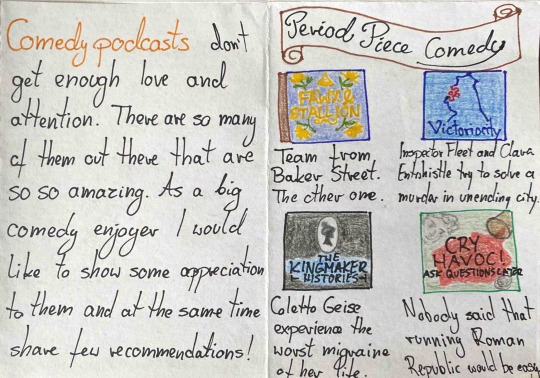
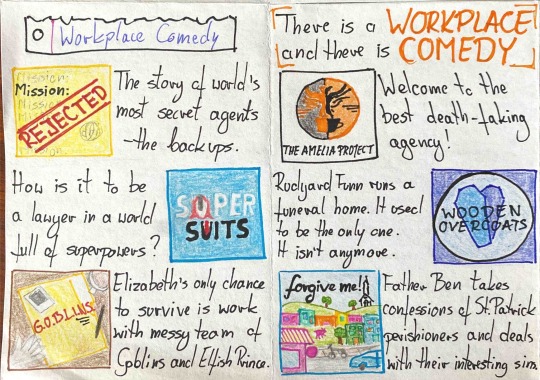

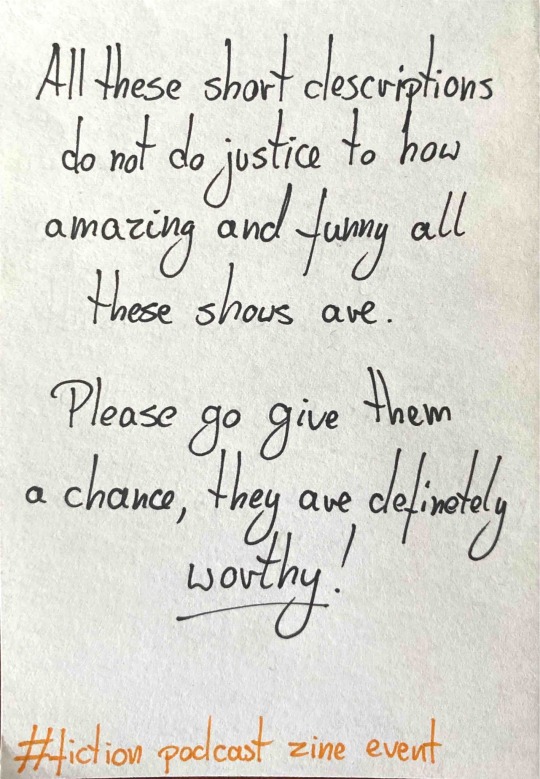
Some of the descriptions/part of them were taken from shows themselves or their descriptions. Please, ignore all the spelling mistakes.
IDs in alt texts and under the cut (I guess they might be especially needed here)
[ID: Front cover of a zine. There is big text: „Comedy podcasts appreciation-recommendation zine” and red heart below.
Page 1: Text: „Comedy podcasts don’t get enough love and attention. There are so many of them out there that are so so amazing. As a big comedy enjoyer I would like to show some appreciation them and at the same time share few recommendations with you!”
Page 2: At the top of the page there is text: „Period piece comedy” on a scroll. Below there four podcasts’ cover arts and descriptions. First podcast is Fawx & stallion and the text says: „Team from Baker Street. The other one.”. Second podcast is Victoriocity and the text says: „Inspector Fleet and Clara Entwhistle try to solve a murder in unending city.”. Third podcast is The Kingmaker Histories and the text says: “Colette Geise experience the worst migraine of her life.”. Fourth podcast is Cry Havoc! Ask Questions Later and the text says: “Nobody said that running Roman Republic would be easy”.
Page 3. There is title at the top of the page: “Workplace comedy”. There are three podcasts’ cover arts and descriptions. First belongs to Mission Rejected and the text says: “The story of world’s most secret agents - the backups.”. Second belongs to Super Suits and the text says: “How is it to be a lawyer in a world filled with of superpowers?”. Third one belongs to G.O.B.L.I.N.S and the text says: “Elizabeth’s only chance to survive is work with messy team of Goblins and elvish prince.”
Page 4: There is title at the top of the page: “There is a workplace and there is comedy”. Below there are three podcasts’ cover arts and descriptions. First belong to The Amelia Project and the text says: “Welcome to the best death-faking agency!”. Second belongs to Wooden Overcoats and the text says: “Rudyard Fun runs a funeral home. It used to be the only one. It isn’t anymore.” Third belong to Forgive me! and the text says: “Father Ben takes confessions of St. Patrick’s parishioners and deals with their interesting sins.”
Page 5: There is a title at the top of the page: “Sci-fi comedy”. Below there are three podcasts’ cover arts and descriptions. First one belongs to Stellar Firma and the text says: “listen how most luxurious planets are designed! If only designers knew what they were doing…”. Second belongs to Starship Q Star and the text says: “”First all woman and non-binary crew” becomes the last six humans in the universe.”. Third belongs to Oz9 and the text says: “Join the useless crew of Oz9as they limp around in space looking for a new home.”
Page 6: There is title at the top of the page: “Fantasy comedy”. There are three podcasts’ cover arts and descriptions. First belongs to Dark Ages and the text says: “Rivercliffe Museum staff has to survive Dark Lord, low attendance and each other.”. Second belongs to Wizard seeking wizard and the text says: “Matchmaking show for wizards! Find a wizard you need!”. Third belongs to Absolutely No Adventures and the text says: “Chosen one of every prophecy opens a bakery with one rule: absolutely no adventures”.
Page 7: Text: “All these short descriptions do not do justice to how amazing and funny all these podcasts are. Please go give them a chance, they are definitely worthy!”. At the bottom of the page there is text: “#fiction podcast zine event”.
#I am so proud of it but there so many mistakes here#comedy podcasts my beloveds <3#fiction podcast zine event#fiction podcast zine festival#podcast recommendations#fawx & stallion#victoriocity#the kingmaker histories#cry havoc! ask questions later#mission rejected#super suits#goblins pod#the amelia project#wooden overcoats#forgive me podcast#stellar firma#starship q star#oz 9#dark ages podcast#wizard seeking wizard#absolutely no adventures
243 notes
·
View notes
Note
I have no clue if you've done this already, but I would love some royal-related vocabulary!! I write about a royal family (one in the middle ages) and it gets tiring looking for all the correct terms😅
Some Medieval Vocabulary
Amercement - financial penalty imposed by the King or his justices for various minor offences. The word comes from the fact that the offender is said to be ‘in mercy’.
Assize - meeting of feudal vassals with the King, and the edicts issued from it. It comes to have a legal context of court; but then in the early days the king’s court was just that – a place where law was made and justice executed. Hence the double meaning of the word court.
Borough - town with the right of self government granted by royal charter
Chamber - the financial office of the royal household
Chamberlain - officer of the royal household, responsible for the Chamber. He was therefore responsible for administration of the household and the private estates of the King.
Chancellor - officer of the Royal Household who originally served as the monarch’s secretary or notary, managing the Chancery, filled with clerks who produced writs and written instructions and records.
Chivalry - the knightly class of feudal times. The primary sense of the term in Europe in the Middle Ages is “knights,” or “fully armed and mounted fighting men.” Thence the term came to mean the gallantry and honour expected of knights. Later the word came to be used in its general sense of ��courtesy.”
Constable - the title of an officer given command in an army or an important garrison. Also the High Constable was the officer who commanded in the King’s absence and commanded the King's army.
Destrier - warhorse; so called because it would be led using the right hand
Diadem - a royal crown
Eyre - the king and his justices would traditionally travel through the kingdom to deliver justice. As the king became more centred at Westminster, justices would continue to travel – and were called Justices in Eyre. From the French errer, "to travel".
Heir apparent - the declared heir to the throne, normally the king’s eldest son
Heir presumptive - the presumed heir to the throne in the event of the king dying without an heir apparent
Justiciar - head of the royal judicial system and the King’s viceroy during his absence from the country
League - somewhere between 1½ to 3 miles. Traditionally, the distance a person or horse can walk in one hour.
Mark - money, worth thirteen shillings and four pence, i.e. two thirds of £1
Mead hall - in the Middle Ages in Northern Europe and Scandinavia, a large building with just one room that was used as a central place for entertainment and as a living place for a lord/king
Minstrel - a traveling musician and singer common between the 11th and 15th centuries
Ordeal - a method of trial in which the accused was given a physical test which could be met successfully only if they were innocent (e.g., ordeal by fire)
Purveyance or prise - in early medieval days, the lord had the right to be entertained by his followers, at their expense. And of course this applied to the greatest lord of all – the king. Over time, the king travelled less, but still wanted the benefit of being able to have him and his household live at someone else's expense – and so he exercised the right to take goods and food in lieu of being there. It was the policy to pay – but payment was often small and late.
Saga - a long story about Scandinavian history, written in the Old Norse language in the Middle Ages, mainly in Iceland
Steward - man responsible for running the day to day affairs of the manor or castle in absence of the lord
Subinfeudation - in medieval Europe, the process by which a vassal (i.e., a man who lived on land given to him by a powerful land owner in exchange for agreeing to fight for him) allowed someone else to use or live on part of their land
Sumpter - packhorse, pony, mule or other animal
Thegn - military companion to the king
Sources: 1 2 3 4 5 6
Here's what I found for you. Hope this helps! Would love to read your work if it does—sounds like the kind of writing I enjoy :)
More: Medieval-Related Vocabulary ⚜ Word Lists
#anonymous#terminology#medieval#middle ages#writeblr#writing reference#spilled ink#dark academia#writing inspiration#langblr#words#linguistics#history#literature#writers on tumblr#poets on tumblr#writing prompt#creative writing#fiction#light academia#poetry#writing resources
192 notes
·
View notes
Text
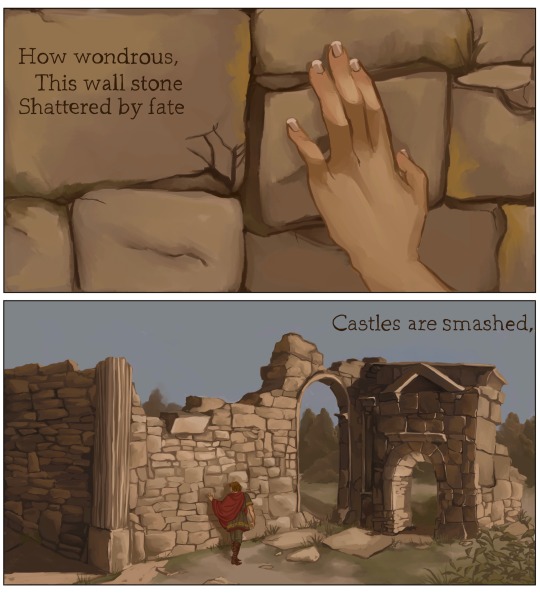



Comic for “The Ruin” a poem written by an unknown author in the 8th or 9th century
How wondrous, this wall stone,
Shattered by fate.
Castles are smashed,
The work of giants, crumbled.
Ruined are the roofs,
Tumbled the towers.
Broken the barred gates.
Frost in the plaster,
Ceilings a-gaping.
Torn away, fallen,
Eaten by age.
#the ruin#history#poetry illustration#roman ruins#historical illustration#digital art#digital painting#artists on tumblr#art#my art#Roman#myth#dark ages#medieval
2K notes
·
View notes
Text

~ Florence Harrison "Oh why does yon pale face look at me from out the golden cloth" from Early Poems of William Morris
via internet archive
#florence harrison#william morris#illustration#fine art#art history#vintage illustration#australian art#australian artist#art nouveau#pre raphaelite#pre raphaelism#arts and crafts movement#20th century art#early 20th century#early 1900s#dark academia aesthetic#dark academia#fairytale art#fairy tale art#fairy tale aesthetic#fairytale aesthetic#1910s art#1910s style#1914#e#golden age of illustration#the golden age of illustration
124 notes
·
View notes
Text
I have asked everyone to read Revelation 21 if they wanted to know how this movie ends 👇
Revelation 21: 1-8 states:
Then I saw a new heaven and a new earth; for the first heaven and the first earth had passed away (vanished), and there is no longer any sea. And I saw the holy city, new Jerusalem, coming down out of heaven from God, arrayed like a bride adorned for her husband; and then I heard a loud voice from the throne, saying, “See! The tabernacle of God is among men, and He will live among them, and they will be His people, and God Himself will be with them [as their God,] and He will wipe away every tear from their eyes; and there will no longer be death; there will no longer be sorrow and anguish, or crying, or pain; for the former order of things has passed away.” And He who sits on the throne said, “Behold, I am making all things new.” Also He said, “Write, for these words are faithful and true [they are accurate, incorruptible, and trustworthy].” And He said to me, “It is done. I am the Alpha and the Omega, the Beginning and the End. To the one who thirsts I will give [water] from the fountain of the water of life without cost. He who overcomes [the world by adhering faithfully to Christ Jesus as Lord and Savior] will inherit these things, and I will be his God and he will be My son. But as for the cowards and unbelieving and abominable [who are devoid of character and personal integrity and practice or tolerate immorality], and murderers, and sorcerers [with intoxicating drugs], and idolaters and occultists [who practice and teach false religions], and all the liars [who knowingly deceive and twist truth], their part will be in the lake that blazes with fire and brimstone, which is the second death.”
It's NOT the end times, it's the end of an age which the Book of Matthew speaks about repeatedly. Go read 👀 that.
This IS the greatest time to be alive in all of History combined and most of you are sleeping right through it. 🤔
#pay attention#educate yourselves#educate yourself#reeducate yourselves#knowledge is power#reeducate yourself#think about it#think for yourselves#think for yourself#do your homework#do some research#do your research#do your own research#ask yourself questions#question everything#its biblical#biblical time#wake up#save humanity#save the children#bible study#bible scripture#end of an age#end of an era#history in the making#life#understand#time to wake up#dark to light#new earth
64 notes
·
View notes
Text

illuminated manuscripts & puerh tea📜🫖
#dark academia#illuminated manuscript#tea#puerh#puer#gong fu cha#gongfu tea#manuscript#aesthetic#cottagecore#books#beautiful#words#academia#aged tea#old things#woodwork#light academia#calligraphy#illumination#history#historical#pu'er
99 notes
·
View notes
Text
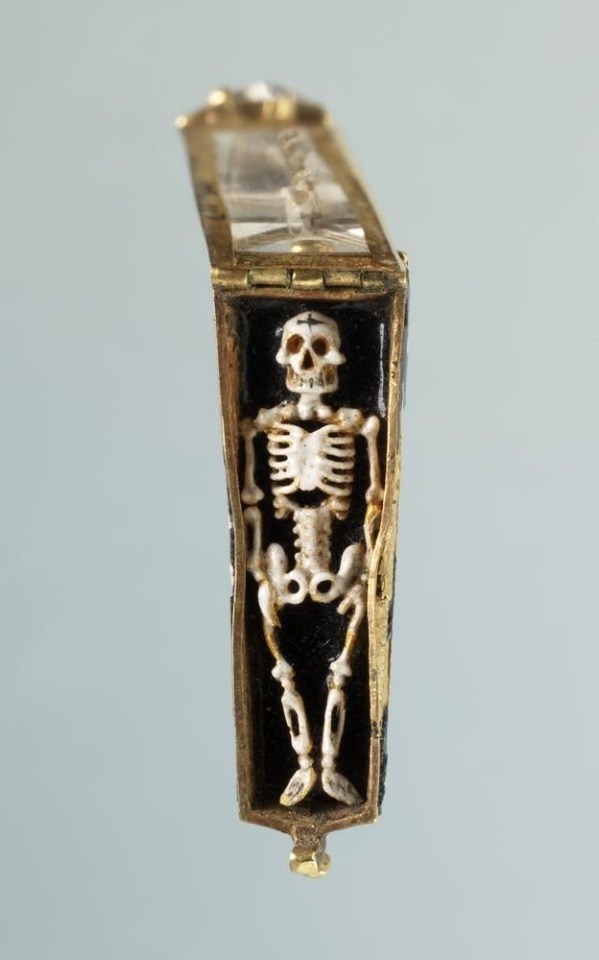
Memento Mori
Gold pendant,
1500s, France
#art history#art#history#european art#medieval#medieval art#middle ages#memento mori#black plague#dark ages#skeleton
443 notes
·
View notes
Text

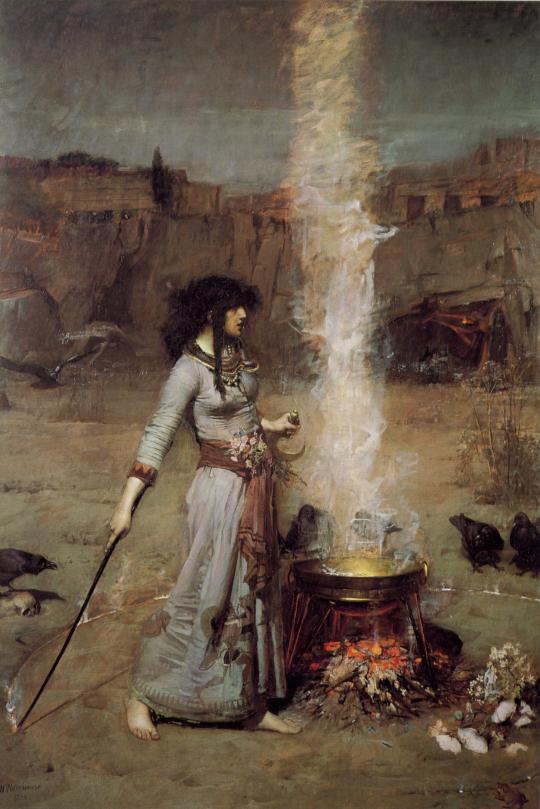
This is a painting (top) I made a few years ago as a tribute to John William Waterhouse's work named ''The Magic Circle'' (bottom).
The mood, stortytelling and simplicity of the scene really caught my attention, and I wanted to take those elements and add more dynamicism to it when working on my interpretation.
I hope you like it!
Best,
JCH
#dungeons and dragons#board games#concept art#fantasy art#tabletop games#digital painting#magic the gathering#character design#ancient history#witch#occult#sorceress#wicca#gothic#pagan#dark art#the witcher#dragon age
244 notes
·
View notes
Note
I know you mentioned you have ties to both sides of the border. Idk if you live in the states or canada, but I just wanted to say I hope you’ve been doing well, even with the mad house that has been America recently 😭
I'm fine. Extremely, extremely ironically, I swore an oath of service to defend the constitution the same day my country surrendered its soul. And I did so with my badge of office pinned to my lapel with a maple leaf. The same way I walked around with my 'i voted' sticker on my coat just next to my red poppy in utter shock for a week after the election. I'm fine and I'm doing better than most people around me.
And I will survive the next four years of service to the archives of this country, my fucking country, as my grandfather survived the Grande Noirceur, the great darkness, in the nation that bore me. Americans around me are panicking and and wringing their hands and wondering how they'll survive the next four years. Some more realistically and rationally than others. I'm fine. I believe in tomorrow even from this present, coming from a worse past. I was raised by a man who taught me how to survive this and I have never been so steady.
A man who after fighting for Canada and against fascism for five long years was slapped into an insane asylum for communist sympathies and union organizing. He was only released after an outbreak of tuberculosis emptied and shuttered that institution. They further withheld treatment until he signed a confession that barred him from teaching ever again. His livelihood was destroyed three, four, five, six times over even after that because he did not bend and turn the other cheek to fascism. He lost track of how many times he was jailed. Once because he did not betray his mother, a practicing midwife, and turn her in for inducing abortions. For distributing literature. For agitating against injustice and defending the vulnerable and pushing, pushing, pushing for a better world.
And eventually, that great darkness ended and dawn arrived. The Révolution tranquille began. My mother, his youngest child, was born into the liberalizing, secularizing world her father had fought for. I will have to fight. We will all have to fight. Organize, communicate, keep each other safe. Love thy neighbor and screw your courage to the sticking place and we too will have children who will not know this darkness. Fight, fight like hell with everything you have and every thing you are. And some day, some bright and beautiful day, we will kiss the foreheads of our sons and daughters the way my grandfather did my mother and we will know that we have won.
#the ask box || probis pateo#moaning || personal/business posts#I bled to death at age 23#the greatest darkness I'll ever see was the grave i pulled myself out of#not this administration#the suns rising#my bloods pumping#that is enough for now#I cant do much more than preserve the voices of this democracy's history#but someone will listen to them from a better tomorrow
25 notes
·
View notes
Text
I just realised that the reason Tom Riddle wanted to be a DADA teacher because H¡tIer tried to be accepted at an ARTS school but failed.
That so obvious but I never thought about it;-;
#harry potter#harry styles#prince harry#tom riddle#voldemort#tHe dARk LoRd#drarry#harry x draco#deamus#snarry#I just thought about that because I'm having a snarry fase LEMME TAG IT *SOBB*#before someone says 'EURUEW proShippER' AGED UP AND NOT LIKE 12 YEAR OLD HARRY#i....actually saw someone tagging that under a fanfic and vomited in an instand-#wolfstar#grindeldore#i guess#yea.#history lesson#for you#4u#my dear children#wuuuiiiiii
89 notes
·
View notes
Text

56 notes
·
View notes
Text
This time together with my Comedy podcasts appreciation-recommendation zine I prepared Comedy (and comedy adjacent) Podcasts Bingo!

Reblog and mark which podcasts have you listened to, take a recommendation and share new podcasts with me!
#comedy podcasts my beloveds#comedy podcasts bingo#fiction podcasts#audio drama#comedy podcasts#cry havoc! ask questions later#wolf 359#wizard seeking wizard#the amelia project#fawx & stallion#the case of the greater gatsby#super suits podcast#civilized podcast#the kingmaker histories#sected#dark ages podcast#starship q star#we fix space junk#mission rejected#quid pro euro#absolutely no adventures#time:bombs#forgive me podcast#stellar firma#goblins pod#victoriocity#human b-gon#oz 9#wooden overcoats
212 notes
·
View notes